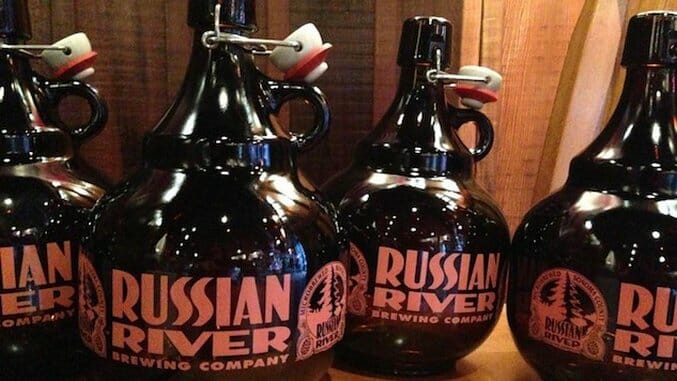6 Questions For Russian River’s Brewmaster Vinnie Cilurzo
Photos via Russian River
Pliny the Younger is an anomaly, if a beer could ever be called one. The Russian River Brewing Company’s seasonal release, a rich Simcoe hop-driven triple IPA, has become the stuff of brewing legend since 2010, when Beer Advocate gave it a perfect rating, thereby dubbing it the best in the country.
It might be surprising, then, to learn that Russian River’s origins don’t lie in generations of brewing visionaries or grandiose ambitions; rather, the brewery has roots in Korbel, the winery that founded it, and a particularly innovative brewmaster named Vinnie Cilurzo.
Korbel’s brewing project was short lived — the operation only lasted from 1997 until 2003 — but when the winery decided to cut it, Cilurzo and his wife Natalie couldn’t let it go. They decided to take a chance and run the brewery independently. Turns out that was a pretty smart move. The following year, the Cilurzos were able to open a brewpub, and in 2005, Pliny the Younger was born.
This February’s release will be the first time Cilurzo believes that Younger is closer to perfect than ever before.

Paste: Tell me about when you realized Pliny the Younger was a big deal.
Vinnie Cilurzo: Until 2010, it was just another beer. [One morning], I rolled in the pub at 6 [a.m.], got the beer connected and looked out front, and there was a line of people down the block. I went out there and asked, ‘What are you guys doing here? We don’t open until 11.’ And they said, ‘Your beer is one of the top rated in the country on a couple of beer rating websites.’ I don’t think I even knew what Beer Advocate was at the time. I picked up the phone and called Natalie and said, ‘I don’t think we’re ready for this.’ In an eight-hour period, we poured 20 barrels [40 kegs] of Pliny the Younger. That’s when we changed our whole system.
Paste: What sort of changes did you institute over the years with serving Younger?
-

-

-

-

-

-

-

-

-

-

-

-

-

-

-

-

-

-

-

-

-

-

-

-

-

-

-

-

-

-

-

-

-

-

-

-

-

-

-

-








































